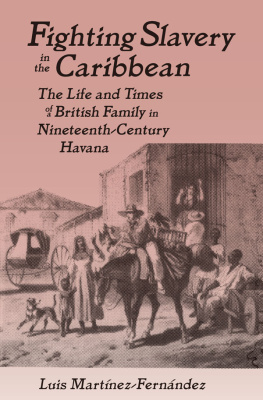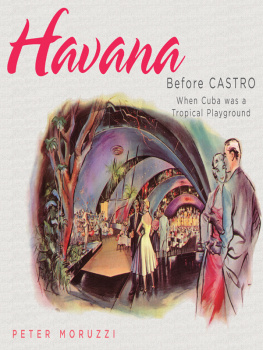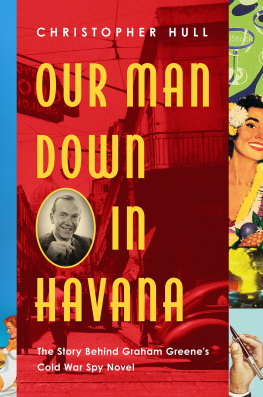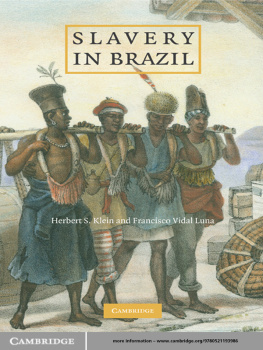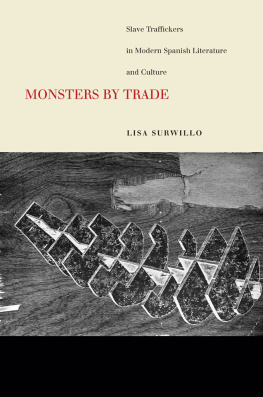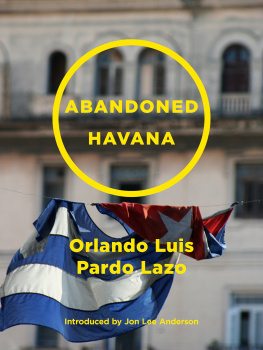| Fighting Slavery |
in
the | Caribbean |
Robert M. Levine, Series Editor
BITITAS DIARY
Childhood Memoirs of Carolina Maria de Jesus
Carolina Maria de Jesus, Author
Robert M. Levine, Editor
Emanuelle Oliveira and Beth Joan Vinkler, Translators
POLITICS AND EDUCATION IN ARGENTINA, 19461962
Mnica Esti Rein
AFRO-BRAZILIAN CULTURE AND POLITICS
Bahia, 1790s-1990s
Hendrik Kraay, Editor
FIGHTING SLAVERY IN THE CARIBBEAN
The Life and Times of a British Family in Nineteenth-Century Havana
Luis Martnez-Fernndez
PILLAGING THE EMPIRE
Piracy in the Americas, 15001750
Kris Lane
THE SWEAT OF THEIR BROW
A History of Work in Latin America
David McCreery
(forthcoming)
THE SWORD OF HUNGER
A Latin American History
Roberta Delson and Robert M. Levine
(forthcoming)
First published 1998 by M.E. Sharpe
Published 2015 by Routledge
2 Park Square, Milton Park, Abingdon, Oxon OX14 4RN
711 Third Avenue, New York, NY 10017, USA
Routledge is an imprint of the Taylor & Francis Group, an informa business
Copyright 1998 by Luis Martnez-Fernndez. All rights reserved.
No part of this book may be reprinted or reproduced or utilised in any form or by any electronic, mechanical, or other means, now known or hereafter invented, including photocopying and recording, or in any information storage or retrieval system, without permission in writing from the publishers.
Notices
No responsibility is assumed by the publisher for any injury and/or damage to persons or property as a matter of products liability, negligence or otherwise, or from any use of operation of any methods, products, instructions or ideas contained in the material herein.
Practitioners and researchers must always rely on their own experience and knowledge in evaluating and using any information, methods, compounds, or experiments described herein. In using such information or methods they should be mindful of their own safety and the safety of others, including parties for whom they have a professional responsibility.
Product or corporate names may be trademarks or registered trademarks, and are used only for identification and explanation without intent to infringe.
Library of Congress Cataloging-in-Publication Data
Martnez-Fernndez, Luis, 1960
Fighting slavery in the Caribbean : the life and times of a British family in nineteenth-century Havana / Luis Martnez-Fernndez.
p. cm. (Latin American realities)
Includes bibliographical references (p. ) and index.
ISBN 0765602474 (alk. paper). ISBN 0765602482 (pbk. :alk. paper)
1. CubaHistory18101899. 2. Havana (Cuba)Social conditions. 3. Havana (Cuba)Description and travel. 4. British and Spanish Mixed Commission for the Suppression of the Slave Trade. 5. Slave-tradeCubaHistory19th century. 6. BritishCubaHavanaAttitudes. 7. Visitors, ForeignCubaHavanaAttitudes. 8. Backhouse, George Canning. 9. CubaRace relations. I. Title. II. Series
F1783.M386 1998
972.9105dc21
9732665
CIP
ISBN 13: 9780765602480 (pbk)
ISBN 13: 9780765602473 (hbk)
A mis abuelos maternos, Luis Fernndez, de Pinar del Ro,
y Lourdes Cisneros, de Camagey.
Y a la memoria de mis abuelos paternos,
Celestino Martnez, de Asturias,
y Mara de la Conceptin Lindn, de Galicia.
Por los cuentos que me hicieron y los
otros tantos que me hubieran querido hacer.
____________________
Contents
____________________
____________________
The Latin American Realities series presents aspects of life not usually covered in standard histories that tell the stories of governments, economic development, and institutions. Books in this series dwell on different facets of life, equally important, but not often analyzed or described. How have underground economies worked? What strategies have poor people employed to cope with hardship and to improve their lives? How have government policies impacted everyday life? What has been the importance of popular culture? How have members of minority or disadvantaged peoples in Latin Americablacks, recent immigrants, indigenous peoples, men and women of intermediate racial statusfared? How have social and economic changes affected them?
George Backhouses story not only offers a fascinating travelers account of nineteenth-century Cuba, but it offers invaluable insight into the history of the Cuban sugar industry, its reliance on slave labor, the islands race relations, and the movement to abolish slavery, of which Backhouse played a leading role as a member of the Mixed Commission for the Suppression of the Slave Trade. Luis Martnez-Fernndezs book is invaluable on several levels. Not only does it focus on the lives of real people, setting traditional historical events into an accessible context, but it offers rare insights into Cubas economic life, its social organization, and its racial conundrum. Extensive research went into this book: private papers, diaries, correspondence, newspapers, and dozens of contemporary studies, travel accounts, and political tracts. Readers will be grateful for the authors sensitive analysis of the nuances of human relations against a background of tense historical change.
Robert M. Levine
____________________
I worked on this book, on and off, from the time I first laid eyes on the Backhouse family documents over ten years ago. In the process I have accumulated debts of gratitude with many individuals and institutions who in some way made possible the research, writing, and publication of this book.
I remain grateful to my wife, Margie Fernndez, and my sons Luis Alberto and Andrs, for all they have taught me and for their love, patience, and understanding. My parents, Celestino Martnez and Luisa Fernndez, were the first to read an early version of the manuscript. Their encouraging assessment may have been biased but I took it. I thank them for their love and support. My grandparents, Luis Fernndez and Lourdes Cisneros, and my aunt and cousin, Mercedes Fernndez and Mercedes Almua, opened their home and hearts during my research visits to Havana, that wonderful city I call home. I am grateful for all their help.
Over the past decade I have enjoyed the friendship and have benefited from the guidance of former professors, now colleagues, and other fellow historians. John J. TePaske, my mentor at Duke University, has guided and encouraged my work over the years. I also carry a debt of gratitude toward Louis A. Prez, Jr., who more than anybody else outside of Cuba has promoted and led the field of Cuban historical studies. I also wish to acknowledge other colleagues and friends, who in some way have been a part of the making of this book: Luis E. Agrait, Jorge Alonso, Carlos Alvarado, Silvia lvarez Curbelo, Carlos Bartolom, Herman L. Bennett, Sagrario Berti, Nigel and Ellie Bolland, Stephen E. Bronner, Keith de Lellis, Georgette Dorn, Joseph Dorsey, Faye Dudden, William R. Erwin, Jr., Ramiro Fernndez, Richard Foley, Araceli Garca Carranza, Humberto Garca Muiz, Bianca Gmez, Betty Gonzlez, Filiberto Gonzlez, Lydia Milagros Gonzlez, Jane Grimshaw, Manuel Hernndez Gonzlez, Gad Heuman, H.L. Hoffenberg, Franklin W. Knight, Robert M. Levine, Valentn Llanes, Linda McCurdy, Toms Eloy Martnez, James Masschaele, Mary Moran, Robert L. Paquette, Lizabeth Paravisini-Gebert, Hernn Prez, ngel Quintero Rivera, Richard Ramos, Lynn Roundtree, Francisco Scarano, Michael Siegel, Roslyn Turborg-Penn, Diane Wachtell, James Walvin, Oscar Zanetti, and Nancy Zingrone.
Next page
